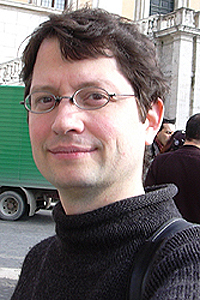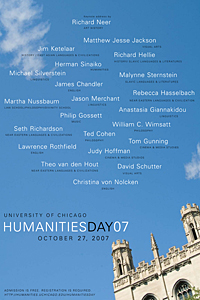Humanities Day offers peek into world of humanistic scholarship
By Josh SchonwaldNews Office
 Richard Neer | |
Is there a “Chicago style” of filmmaking? Do “bloopers” offer insights into a presidential candidate’s character? Do bilingual children develop language skills later than their peers? And what did Ivar the Boneless do during his trip to England?
These questions and many others like them will be answered Saturday, Oct. 27, during the 28th annual University Humanities Day.
The oldest event of its kind in Chicago, this year’s Humanities Day will not only feature lecture-style presentations and question-and-answer sessions by leading Chicago faculty members, but it also will offer film screenings, faculty-guided exhibition tours and live music performances.
“This is traditionally one of the division’s showcase programs” said Martha Roth, Dean of the Humanities Division, of the event that is free and open to the public. “We have a talented line-up of faculty who represent the breadth and range of our 21 departments and committees—and we anticipate some spirited discussions. We are looking forward to a good turnout of friends, alumni and the community,” Roth added.
Richard Neer, the David B. and Clara E. Stern Professor in the Humanities, Art History and the College, will deliver the keynote address, “Painting as a Way of Life: The Blind Orion of Nicolas Poussin,” at 11 a.m. in Mandel Hall. Neer will discuss the relation of 17th-century French painting to early modern ideas of selfhood, skepticism and science.
“The talk is about a picture by the great French artist Nicolas Poussin—one of the last things he ever did, and one of the strangest. The painting, Blind Orion Seeking the Sun, will be the springboard for a discussion of how making and looking at paintings can pose ethical dilemmas; how the humanities might respond to those dilemmas, or fail to do so; and how these responses and failures can help to clarify the differences between the humanities and other modes of inquiry,” said Neer.
This year’s Humanities Day is organized in three sessions, beginning at 9:30 a.m., 1:30 p.m. and 3 p.m. For a complete list of the 24 events, please visit the Web site: http://humanities.uchicago.edu/humanitiesday.
Other presenters and the titles of their lectures include:
 | |
Judy Hoffman, Senior Lecturer in Cinema & Media Studies, will discuss and screen clips of films made by Chicago filmmakers, interpreting the politicians and community organizers as the protagonists and villains, examining locations as the neighborhoods, bars and factories, and offering the set designers as Mies van der Rohe and the Chicago Housing Authority. Hoffman will consider whether there is, in fact, a Chicago style of filmmaking. Christina von Nolcken, Associate Professor in English Language & Literature, will introduce participants to Ragnar Hairy Breeches, Ivar the Boneless and Eric Bloodaxe, as she examines the impact Vikings had on medieval England.
Michael Silverstein, the Charles F. Grey Distinguished Service Professor in Anthropology, Linguistics, Psychology and Interdisciplinary Studies in the Humanities, will analyze some of the legendary bloopers of campaign politics—from Howard Dean’s infamous “I have a Scream Speech” in the 2004 Democratic primary race, to Joseph Biden’s remarks about Barack Obama’s blackness earlier this year, to former Virginia Senator George Allen’s notorious moment last year, in which he called an opponent’s Indian campaign worker, “Makaka.” Silverstein will discuss the relationship between these “bloopers” and the politics of campaign messaging.
Humanities Day also will feature several guided tours, including tours of the Oriental Institute Museum’s renowned collection of art and artifacts from the ancient Near East and the Joseph Regenstein Library’s collection of Renaissance maps and printed images, which depict major monuments and antiquities in Roman. Musical performances will include a Fulton Recital Hall performance of the critically acclaimed New Budapest Orpheum Society. The group, headed by artistic director Philip Bohlman, the Mary Werkman Distinguished Service Professor in the Humanities and Music, has revived the music of the longest-running Jewish cabaret in Vienna.
Seating is limited for all of the Humanities Day events and advanced registration is required at: http://humanities.uchicago.edu/humanitiesday.
![[Chronicle]](/images/sidebar_header_oct06.gif)